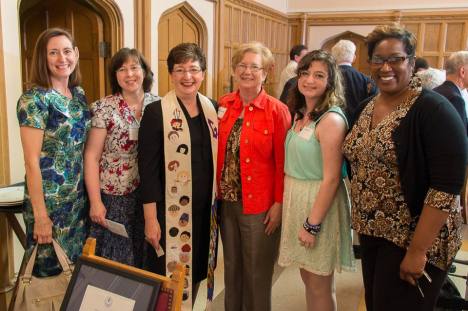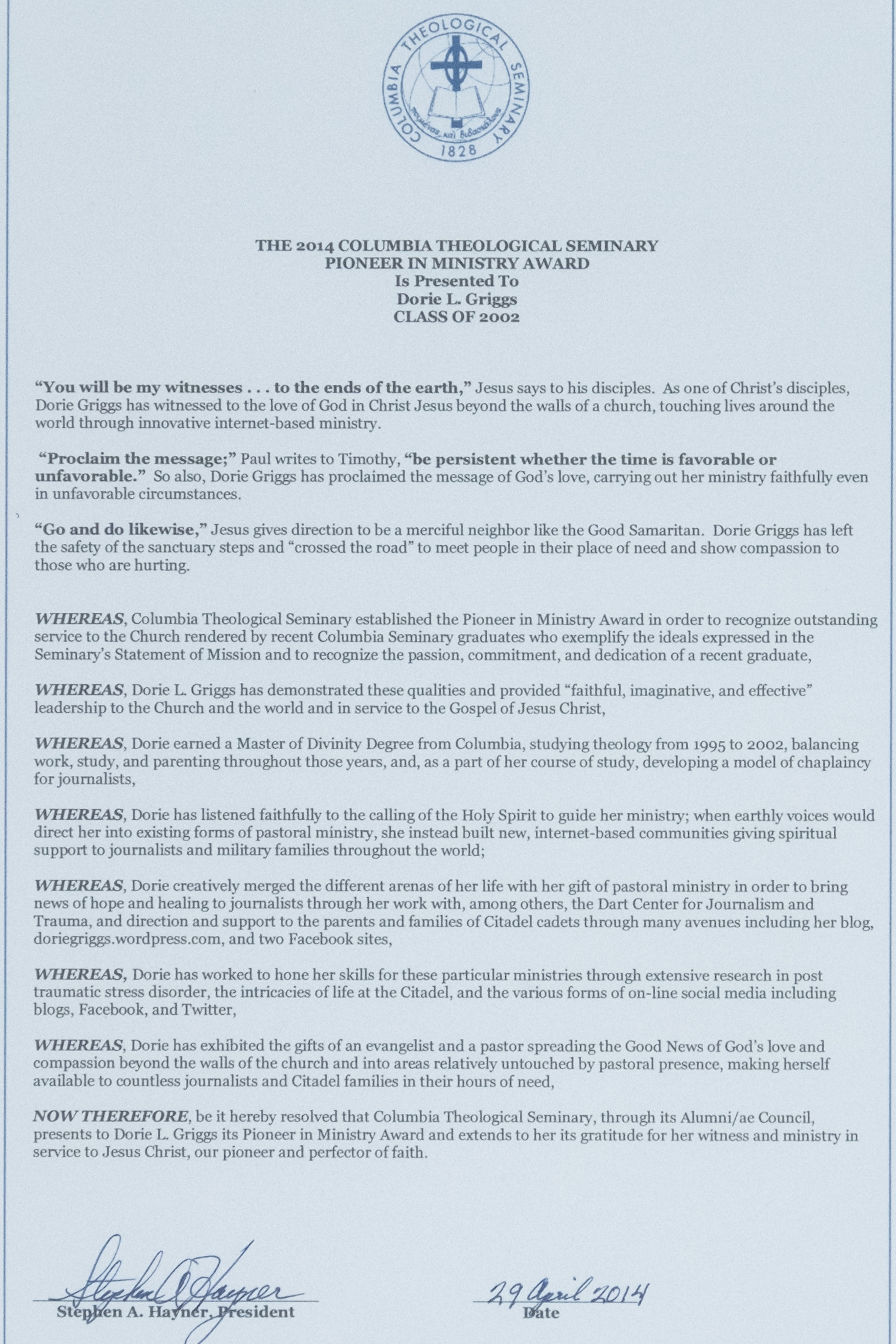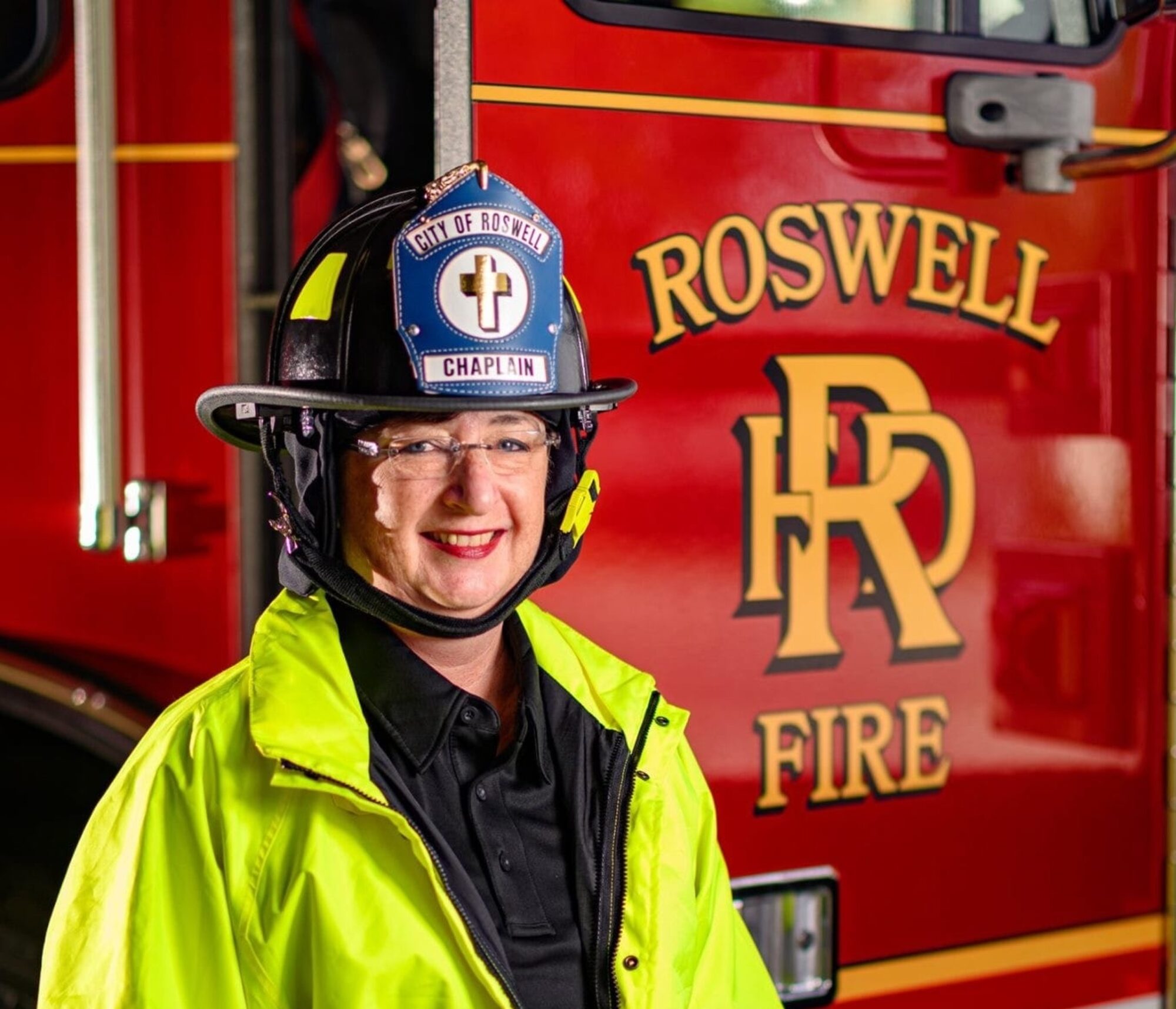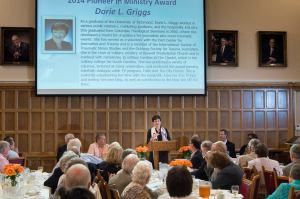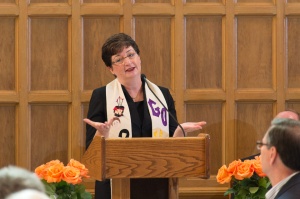
For as long as I can remember I’ve had a vague idea that my life purpose is to help people. Just how that should play out was not very clear for a very long time.
After college I worked in sports PR and then the hotel business. I was able to do small acts of kindness in those positions. Years later when I started a position at a United Methodist Church retreat center a tug to go to learn more about my faith grew stronger.
I entered Columbia Theological Seminary in 1995. At the time I was divorced with two small boys. I worked full-time and went to school full-time and had to squeeze in work-study hours too. The boys and I lived on campus in an apartment, but they remained in the school they attended 20 miles away.
It was a chaotic time to say the least. It was also a time of great growth and change.
Early on I felt God had led me to Columbia, not to do something different, but to enhance the work I was already doing in a ministry of hospitality.
Some where along the way as I struggled to discern where God was calling me, a thought came to me. My husband, who is a photographer, was a member of a group called Christians in Photojournalism. I began pondering what it would look like to be a caring presence for all journalists.
Early in my sports PR career I learned about the difficulties in being a journalist from a videographer friend. He worked for a local news station in Richmond, VA. He told me back in 1981 that when lists of most dangerous jobs come out, photojournalists/videographers are usually at the top. That thought haunted me for years. I met reporters who covered breaking news who would recount assignments where the area was cleared for them to enter and they stepped on a body part. What do you do with that experience?
In the middle of my long tenure in seminary, it took 7 years to finish what is usually a three-year full-time program, I began to investigate what was out there as far as support for journalists. One summer I spent time researching the topic. I would Google terms like “journalists ministry,” “reporters chaplain.” Not much showed up in these searches back in 2000. Then one day I found a group, not a faith-based organization, that seemed to understand what I knew inside. The Dart Center for Journalism and Trauma had articles on how to sensitively cover victims of violence, but they also offered tips for journalists to take care of them self after covering a traumatic event like war, natural disasters, and violent crimes. I began corresponding with the executive director and also the founder of the Dart Center.
During the 2001-2002 school year, my final year at Columbia, I was admitted to a clinical pastoral education (CPE) group. My context for ministry was working with journalists in the press room at. Georgia Tech football and basketball games as well as the Men’s Final Four. While the journalists weren’t covering trauma, the access to reporters and photojournalists led to incredible conversations. It was the year of 9/11. It was also the hear the head football coach at GT left for a head position at Notre Dame, his dream job, only to lose the job when discrepancies in his resume came to light.
The year ended with me feeling affirmed that what I knew inside was true, journalist do benefit from having a caring presence in their midst. My CPE supervisor affirmed that call in our final meeting. She also told me that my journey could be very lonely and suggested I build my own support network.
The years after graduation were filled with wonderful opportunities to grow and meet journalists. I worked for a program called Faith And The City that helped clergy in formation (seminarians) learn to be actively involved in civic affairs in their towns. I produced an interfaith dialogue cable television program called Faith And The City Forum: Interfaith Dialogue on Civic Issues. It was an exciting time.
During my first year at Faith And The City I attended my first meeting of the International Society of Traumatic Stress Studies where the Dart Center also brought their fellows for a time of intense learning. It was wonderful to finally meet the people I had only exchanged emails with up to that point. They welcomed me in and introduced me to their fellows, journalists from around the world who covered war, disasters, and other traumatic stories.
During the lead up to the war in Iraq I began a prayer list for journalists who were covering the conflict. many of whom were embedded with troops. The list grew and eventually my husband helped me put it on my website. Soon the National Press Photographers Association posted a link to the list and emails began coming in thanking me for my efforts. Some asked for their names to be added to the list. After receiving these emails and after developing regular communications with journalists in war zones, I knew this is what God called me to do.
Unfortunately my path with the organized church was not so clear. While I knew I was called to be a caring presence for journalists, finding a way to be ordained to that ministry was not in the cards. It was not the fault of the organized church and the committees. Deep down I knew I did not want to serve in an ordained position. It was only after the conversation with the father of a journalist friend that I had the courage to claim my call and leave the formal ordination process.
He had started a Bible study on the PGA golf tour in the 1960’s. He told me, “You might need to do what I have done. I’ve modeled my ministry on Paul. He was a tentmaker by trade, but he also had a very important ministry.” Since I did not feel called to traditional ministry being able to administer the sacraments was not a motivator for me to be ordained. From that day forward I claimed my call and left the ordination process.
Since that time I’ve had the privilege to be present for scores of journalists as they wrestled with the news stories they have covered. I’ve learned things about their work things like, in a situation where the smell of decaying bodies is overwhelming, using Vick’s vapor rub under your nose while wearing a bandana over your nose is one way to mask the smell. I was in a film called, War and Truth, about journalists in Iraq. During the taping of the film I had the opportunity to meet a reporter I know I had added to the prayer list the year before. It was a powerful moment when we met and I told him he had been in my prayers for over a year.
I was interviewed on the local NBC station about my work. During a Workplace Chaplaincy conference at the Yale Center for Faith and Life I led a break out session on the need to provide pastoral care for journalists. The following year I led a similar break out session for the Association of Professional Chaplains. All these opportunities presented them self to me even though I was not in a tradition ministry position.
I experienced a shift in my focus when my oldest son decided to attend The Citadel on a four-year Army ROTC scholarship. By this time I knew quite a bit about the type of experiences our soldiers are exposed to. It was hard to be excited about his choice of career and school because of my fears for his safety. I eventually learned to respect a process I know I would not have succeeded in. It became evident to me that there are many people, like my son, who are competitive, and driven to do well in intense situations. I learned how to be a supportive parent in a very tough environment.
My participation in the Citadel Family Association led to many conversations and emails from anxious parents. By my son’s junior year I realized that I was using what I had learned in pastoral care classes to help be a listening presence to parents. Not everyone who attends The Citadel will go on to serve in the military, about a third do.
Once my son graduated I posted everything I used to share with the Georgia Citadel Parents Group to this blog site so anyone searching for information on preparing for knob year could find it. I remember thinking at the time that it would help parents be able to help their soon to be knob prepare to report and at the same time help lower the big unknown for the parents. Information has the power to lower anxiety. If the parents are less anxious my theory was that they would not bother their son or daughter with as many questions. It would leave the cadet to focus on surviving that very difficult knob year.
For the most part I believe it has helped. I will say that each family, each parent and each cadet is different. The parents have far more access to information now than in 2007 when my son started. Instead of being at home isolated without much information, except what ever is posted to the school website, parents can now join any number of Facebook groups just for parents. I still believe the best course of action is to learn what you need to in order to be supportive, but let the cadet navigate the system on their own.
I continue to stay in touch with quite a few journalists while I keep up this blog site geared toward Citadel families as well as several Facebook groups for Citadel parents.
I didn’t realize until now just how many people outside of these circles have taken note of my outreach.
This past Tuesday Columbia Theological Seminary hosted the annual Alumni/Alumnae luncheon. During the luncheon I was presented with the 2014 Pioneer In Ministry Award. Two of my former classmates nominated me for the work with journalists, but also for the support I’ve given to parents of cadets at The Citadel. It is a tremendous honor to be recognized in this way. It is particularly meaningful to me because CTS is a very traditional educational environment that prepares students to become pastors of congregations or chaplains. I do serve in a ministry, but I do not work for a church or church organization and I am not ordained. The way we “do church” is shifting to an outward focus. Being given this award at this time is affirmation to me that yes, I am exactly where God wants me. I am helping people but in a non traditional, but very ancient ministry of presence.
As a nice foot note to the event on Tuesday an attendee approached me outside the building after the luncheon to say congratulations. He then told me he was a chaplain on the PGA golf tour in the 1960’s. It turned out he is a very good friend of the father of my friend who encouraged me to view my ministry as a tentmaker, like Paul.
Beginning June 2 I will begin a year-long Clinical Pastoral Education residency at the VA hospital in Decatur, GA. I will have 3 other classmates along with a few interns who will join us during a few semesters. We will learn as we provide pastoral care for the patients of the hospital, mental health department and the long-term care facility. I look forward to this next adventure. I will continue to be present on the Facebook groups, but not throughout the work day.


